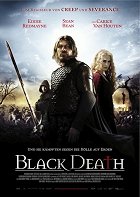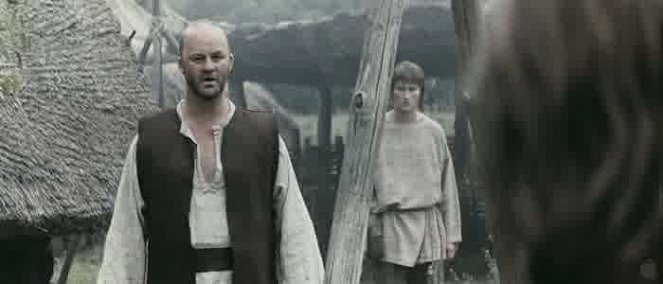Regie:
Christopher SmithDrehbuch:
Dario PoloniKamera:
Sebastian EdschmidMusik:
Christian HensonBesetzung:
Eddie Redmayne, Sean Bean, Carice van Houten, David Warner, Kimberley Nixon, John Lynch, Tim McInnerny, Andy Nyman, Emun Elliott, Tygo Gernandt (mehr)Streaming (2)
Inhalte(1)
In Europa wütet die Pest, nur ein kleines englisches Dorf wurde bisher verschont. Eine Gruppe von Rittern soll im Auftrag der Kirche herausfinden, ob es dort mit rechten Dingen zugeht. Europa im Jahr 1348. Der dunkle Mantel der Pest legt sich unaufhaltsam über den ganzen Kontinent. Während der Schwarze Tod Millionen Menschen dahinrafft, verliert die katholische Kirche in der Bevölkerung immer mehr an Einfluss. Gerüchte gehen um, wonach ein kleines Dorf, in dem heidnische Rituale abgehalten werden, von der Epidemie verschont wurde. Im Auftrag des Bischofs sollen der gläubige Ritter Ulric und seine wenig zimperlichen Gefolgsleute dieses ominöse Dorf finden und dem Spuk mit allen Mitteln ein Ende bereiten. Als Wegführer dient ihnen der zweifelnde Mönchsnovize Osmund, der seine ganz eigenen Gründe für die gefährliche Reise hat. Als die Männer ihr Ziel erreichen, entdecken sie eine fast schon unheimlich wirkende Idylle. Die Dorfbewohner, die unter dem Einfluss der Heilerin Langiva stehen, empfangen die Ritter freundlich. Doch hinter der Fassade scheint ein dunkles Geheimnis zu lauern... (RTL II)
(mehr)Kritiken (9)
So far, Christopher Smith had pleasantly surprised with each of his films (Creep, Severance, Triangle), so I was very much looking forward to Black Death, even if historical horror is not quite my cup of tea. I thought that Smith would conjure a properly dark atmosphere, demonic witches, filthy peasants killed by the plague, a couple of nice scenes in a swamp and a deep forest, and that I would be satisfied. Unfortunately, I’m not. Black Death is a very intimate film shot in a documentary style, which isn’t the most fortunate choice for the theme. Horror set in the middle ages should have slow camera movements, dark filters and weak lightning with candles, and not a frantic cameraman in action mostly in daylight. Moreover, the story is tragically empty, the first half wasn’t fun at all, the second half was a little better, but nothing to write home about. There are about two scenes where the film shows its true potential; unfortunately, it failed to exploit it. Edit after a rewatch due to several reviews that convinced me that I must have missed some sign of “genius”. The result? The mild dissatisfaction remains, but I’m no longer disappointed (i.e. I’m adding one star). The “intellectual message” (yeah, I’m being a little snarky) is nice, but also very plain. I think this is one of those films where the debates around it are more interesting than the film itself. Anyone who wants to love Black Death will love it, anyone who wants to find something groundbreaking in it, will find it, but by their own fault, rather. I still have the impression of a documentary about a LARP game (intentional, to be fair).
()
Solomon Kane meets The Wicker Man. The film is a thoughtful look at militant faith, fanatical atheism, and man's ability to believe without limits in everything he cannot explain. Sometimes you can't do anything else, but everything has its limits. It’s all set in the dirty Middle Ages where fights with the fist and sword are commonplace, so we see plenty of limbs rolling around in the mud. It's not a horror film in the slightest, but it is thought-provokingly rich. 4 ½.
()
Ich habe andauernd darauf gewartet, dass das süße Zittern zwischen Glauben und Unglauben, zwischen Dogma und Ketzerei in einigen saudummen Horror-Klischees verschwinden würde, und bin angenehm schockiert, dass dies nicht der Fall ist. Das Drehbuch macht mit allen Schlüsselfiguren das Vernünftigste - es lässt Sie sich im Nebel ihrer Wahnvorstellungen und Obsessionen verlieren (d.h. aus narrativer Sicht gewinnt hier der gesunde Menschenverstand). Smith hat mich bereits dadurch für sich gewonnen, dass er den Zuschauer nicht mit der Ausstattung des Sets beschwippsen möchte, sondern diesen mit modernen Mitteln direkt inmitten einer schmerzdurchzogenen Welt schiebt - dies erinnert seht an die historischen HBO-Produktionen. Die sehr soliden schauspielerischen Leistungen werden hier durch dramatische Musik in angemessener Weise untermalt. Ich muss noch zugeben, dass ich immer noch dabei bin, das Ganze zu verarbeiten, aber wenn ich mit ein paar starr hinüberkommende Momente wegdenke, ist es eine solide durchdachte und hervorragend ausgeführte Variation aller anderen Variationen von Joseph Conrads "Heart of Darkness". Selbst das Durchspicken des Mittelalters mit vielen modernen Ideeninhalten störte mich nicht. Starke ****.
()
A by no means silly ultra-light "variation" of Witchhammer, which can boldly rank alongside the best smart medieval downers (hello especially The Reckoning).
()
Anfangs dachte ich, dass ich ein großes Problem mit dem Schwarzen Tod haben würde: Ich mag nämlich keine ähnlichen historischen Filme, abgesehen von Ausnahmen natürlich, so dass mich eher der Smith, der Name des Regisseurs zum Anschauen überzeugt hat. Seine Horrorfilme wie Metro oder Triangle waren solides Filmemachen, also war ich auch auf diese Neuheit ziemlich neugierig. Man sagt, dass sie sich durch einige Horror-Elemente auszeichnet. Aber offen gesagt: Das einzige Horror-Element ist wohl die Wiederbelebung der Toten, sonst hat es nicht viel mit Horror zu tun. Trotzdem ist es depressiv und an manchen Stellen ziemlich grausam. Die Atmosphäre konnte man von Anfang an schneiden, die großartige Musik trieb den Film vorwärts, so dass ich mich keinen Moment lang ablenkte. Zum Schluss warteten auf mich dann noch zwei angenehme Überraschungen, die meine Sichtweise veränderten. Also 80 Prozent, wie im Flug vorbei, und morgen schaue ich mir den Film wieder an.
()
In terms of the genre, it is definitely an above-average film, and I can imagine that a similar story could be made in a much worse way. However, this film doesn't completely sit well with me. Nevertheless, my reservations will not be felt by most film fans. Essentially, they are aimed at whether you like the literary works of Dan Brown or Umberto Eco. Both write seemingly the same thing, but upon closer inspection, there is a fundamental difference between them. Umberto Eco writes with top-notch knowledge of history, aesthetics, and contemporary philosophy, so he places his characters and their destinies in a flawlessly historically accurate environment. On the other hand, Dan Brown writes his adventure stories with the knowledge that the historical reality is unimportant to the overwhelming majority of readers, so he throws it together somewhat haphazardly, and his books do not hold up under closer analysis. Of course, this doesn't matter to him in terms of achieving greater commercial success. Black Death functions as an adventurous and mysterious story, where the viewer can admire the dark atmosphere of a country ravaged by a devastating epidemic and the clash of religious values. Deep forests, bandits, and their bloody clash with an expedition, marshes engulfed in mist, and a mysterious village where witches rampage - all of these are genre props skillfully utilized, and together with solid casting, create a solid impression on the viewer. However, as a historical story, it does not hold up, because the conflict between Christianity and paganism was fought out centuries before, and Christianity successfully assimilated popular superstition and various cults. Individual religious heresies and conflicts occurred at a different level, but that is not essential for the average film fan. Rather, I am referring to those screenplay somersaults, such as when in a hopeless situation, two exhausted captive mercenaries, weakened by torture, suddenly free themselves from bondage and within a moment break the resistance of an entire rebellious village. Nevertheless, Black Death earns a solid overall impression of 60% from me.
()
Creatively distinctive, atypical and exceptionally dark, with its grey tones and unflagging mysterious mood, it strongly evokes Annaud's classic The Name of the Rose. Except Sean Bean and co. swing their swords a bit more and now and then someone loses an arm, a leg or a head. It’s not a wild bestial ride, or horror, it oscillates interestingly in its (anti)religious themes, because each of the main characters expresses a point of view and at the same time all of them are essentially negative. This is a purely individualistic and thematically quite proficient film about Christianity and paganism, where it is impossible to clearly define the winner and the right path. With a more renowned director it might have been even bigger and more impressive, but those ambitions were clearly absent , this was supposed to be a small, intimate film. And it's pretty clear where the casting directors drew inspiration for GoT, Carice van Houten is amazing and Bean, well, he’s as good as always.
()
The atmosphere of those hard and uncompromising times is brilliantly captured and there are moments when the tension can be cut. Sean Bean, as always, is excellent and very convincing in his role, as are the other actors, although most of them have the unquestionable advantage of a completely unusual character who happens to be brandishing a sword. The plot is good, the execution is very rough and raw, relying heavily on the terrifying landscape. Films with a religious premise like this are often a dud, but here the filmmakers handled the story strongly and engagingly enough, so I forgive the few mistakes in the script and stick to praise.
()
Evil spreads evil. Christopher Smith took a script with bigger balls than you’ll find in any anatomy book and delivered it to a director who has a reputation for not messing around. How do you rate a film whose only negatives can be chalked up to a budget apparently so low that half of it was swallowed up by poster-making? It is true that if the scenes had been split up among more locations (nearly twenty minutes of the second half take place in the same setting) one would not have that "meandering" feeling of a puzzle. Anyway, it's not Smith's fault, the directing is all an honor. He expertly fights against established principles, has ideas and timing (in particular, he knows exactly when to end dialogue and with it the scene for emphasis), and occasionally surprises with a distinctive directorial contribution – for example, the steadycam worn on the body of a character leading to an execution. Speaking of executions, the film certainly relishes violence, but it doesn't revel in it. Rather, it forms a backdrop for the poignancy of the entire period and holds the viewer's attention. There was a pleasantly surprising action scene (I kind of regretted that there weren't more of them) that finally explains what it means to be smacked in the face with a morning star, and I kind of regretted how long it's been since I've seen a proper swordfight in a movie (a LoTR marathon is probably around the corner). Definitely not to be missed. Make movies like this under the threshold of dependency so I don't have time to crave them.
()

